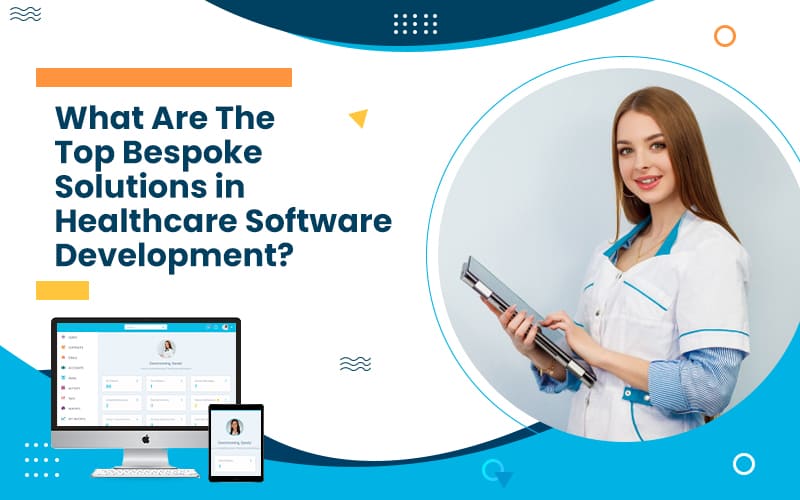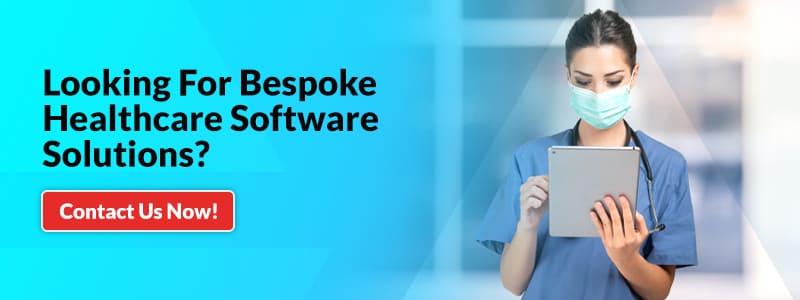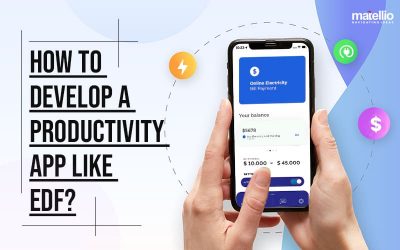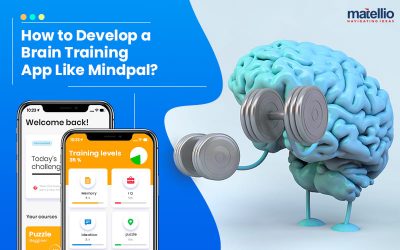What Are The Top Bespoke Solutions In Healthcare Software Development?
The pandemic has changed industries around the world. For a bright tomorrow, technical developments in the healthcare sector are transforming the world. It isn’t saying much nowadays to merely point out that the health sector is disrupted by technology. A wide variety of technical technologies and healthcare software solutions has revolutionized healthcare, and there is no question that innovations will remain in the healthcare industry.
With advancements in digital healthcare innovations, including artificial intelligence, VR & AR, 3D printing, automation, bespoke healthcare software solutions and nanotechnology, the healthcare industry is quickly emerging in front of our very eyes. In addition to monitoring technology but not the other way around, we have to familiarize ourselves with the latest technologies. The practices of healthcare organizations are being reformed by advances in AR/VR, AI, robotics, 3D printing, and nanotechnology.
The latest developments empower healthcare practitioners, and they encourage the overall wellbeing of the general public. We now also have phone applications to monitor our exercise and calorie consumption, combat obesity and heart disease. To track our heart rates, apps are available, and a doctor can then access that to identify irregular rhythms and potentially avoid a heart attack.
However, as the phrase goes, one should be a master of one’s own home, so it’s worth beginning “the future” of bespoke healthcare software development to enhance one’s well being and improve one’s mindset toward the idea of health as one and toward the healthcare industry.
To serve as an introduction, this blog will discuss several bespoke solutions that are transforming the healthcare industry.
But first, let’s quickly discuss,
What is Healthcare Technology or Healthcare Software Solution?
Healthcare technology relates to any IT tools or applications designed to enhance hospitals and administrations’ effectiveness, offer new insights into medications and procedures, or improve the overall quality of care delivered. Today’s healthcare industry is a 2 trillion dollar giant. From wearable technology to AWS integration that collects their data, all healthcare technology and innovations are represented by Health Tech. This is an industry that exploits the masses of sensor data at our reach and is focusing on saving lives more effectively.
It brings data to the hands of physicians, surgeons, first responders, and sometimes even dispatchers working diligently to prescribe healthcare from the Internet of Medical Things (IoMT). The IoMT is projected to be valued at $158.1 billion by 2022, as per Deloitte’s study.
These advancements minimize expenses and staff hours while improving the standard of care received by patients, offering a critical service for the evolving healthcare industry.
It is essential to research key tech developments to grasp better where the healthcare software development market is heading. Even though tested systems are often chosen for their reliability, organizations are still searching for new ways to boost their performance, productivity, and effectiveness. So, let’s speak about bespoke software solutions in healthcare technology in 2021.
How Bespoke Software Solutions are transforming the Healthcare Industry?
The healthcare system is a dynamic one, and technological improvements that are minor and seemingly trivial can significantly affect where and how patients are being served.
To keep a pulse on next year, let’s discuss some of the leading bespoke software solutions in health technology. So here we go.
1. EMR/EHR Software
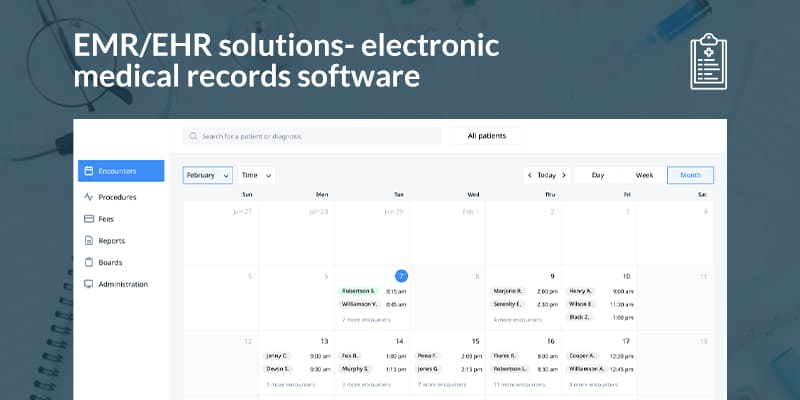
Medical reporting and billing have progressed from a paper-based method to an electronic medium over the last few years. In compliance with rules, a new program was designed to send out electronic bills, and soon there was EHR Software Development. Doctors indeed benefit from all these digital documents; they can view all the care a patient would have ever gotten and sort out potential diseases with a click of a button. Via any connected computer, doctor offices and hospitals could quickly share the patient’s information.
Another advantage is the facilitation of longitudinal documentation of the population and the encouragement of the healthcare system’s integrity, and the prospect of combining it with data on reimbursement. Such types of electronic records eliminate mistakes as the healthcare system evolves.
It will enable doctors to view patients’ records without getting copies or relying on obsolete fax machines. In summary, Bespoke EHR app development allows medical professionals to conveniently access patients’ records and offer more personalized care according to medical history.
2. Wearable Software App
Previously, Apple launched its own patented EKG software for Apple Watches, certified by a doctor. Much like Samsung, FitBit is seeking better opportunities. These portable ECGs offer daily cardiovascular information to individuals.
It’s an extra layer of health information for the everyday consumer with a healthier body. But it would be an early warning device that could be the difference between life and death for those with coronary artery disease. This disease affects more than 2.5 million Americans yearly.
When accelerated heart rates are observed, these bespoke wearable software apps give alert signals to people who wear them, which can then be shared with their doctors if problems worsen. The real data can be transmitted to doctors or hospitals instantly upon detection via solutions like these and through user approval of necessity.

3. Blockchain-based Security Systems
Security has been one of the critical issues about the sharing of confidential and proprietary records. Whether it relates to patients or practitioners, healthcare data may tend to be devastating if it gets into the wrong hands. Blockchain could be used to encrypt any patient data, allowing quick transfer and keeping it protected simultaneously, just giving access to this for those with permission.
Security mechanisms can be generated on a private ledger using blockchain. Only a patient or healthcare provider who is eligible to see all this information can sign up cryptographically to access the information they want. Medical records, including such EHR software development, for example, are praised for the ease of being able to send practitioners back and forth, revised and extended.
If captured, though, this information will illuminate personal data and financial data that could be used against a patient or hospital. Blockchain and intelligent contracts can be a crucial way to maintain this information, becoming widely available only if the eligible individuals who need to access it are checked.
4. Augmented Reality Apps
Another new technology solution which is transforming the healthcare sector is AR and VR. To create its kind of extended reality, augmented reality enhances reality with visuals and sounds. This emerging technology has taken control of sports, leisure, and education, and healthcare is capitalizing on augmented reality for its added value.
Imagine the amount of ease going into a procedure, recognizing that it has been carried out several times before by your physician. Or realizing just what to do, becoming a surgeon, and going into an operation. Augmented reality offers training to conduct processes on a 3D model of a human body to both practising physicians and trainees. This increased situation places doctors in an educational atmosphere that is low-risk, willing to work on simulated patients without the dire consequences of failure.
This makes it easier for the doctor to concentrate on the work at hand and truly appreciate the job at hand, and become even more prepared to tackle the real thing. Virtual reality can be used to show a patient precisely how to administer medicine, wash and dress an injury, and other activities that a patient, rather than just a doctor, can quickly perform to avoid more injury unpleasantness.
5. Telemedicine Software
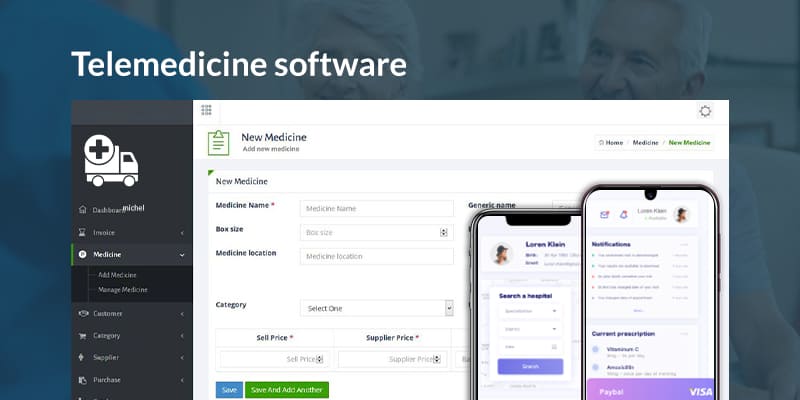
The use of telehealth tools has expedited COVID-19 substantially. 43.5 percent of Healthcare primary care visits used bespoke telemedicine solutions in visits in April of 2020. One of the critical advantages of telemedicine software development over in-person methods is that interaction between patients, health professionals, and other patients is minimized. Wearable devices allow healthcare workers to provide knowledge about patient data in real-time when they stay at home.
More significantly, long after the disease outbreak is over, telehealth’s creation seems set to remain. At the start of the pandemic, 71 percent of people in the US were considering telemedicine, and 50 percent had already used virtual appointments. With telemedicine already growing in prominence in the preceding year, the pandemic was a significant boost to the industry’s growth. The telemedicine market looks likely to break the $185.6 billion mark by 2026.
It’s critical to analyze what characteristics it may have when developing a telemedicine app. Safety, location services, appointment scheduling, video/audio communication, cloud storage, healthcare provider feedback, visit history, and wireless testing via wearable incorporation are among the most critical features. These features are essential, from protection to usability, while considering a telemedicine app development’s needs.
6. Healthcare Chatbot system
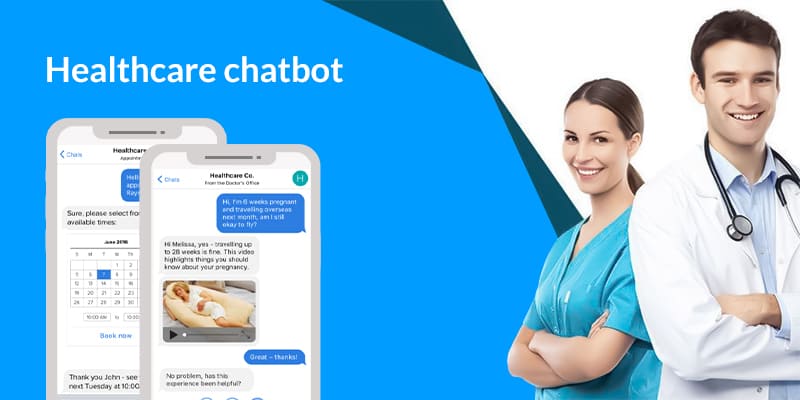
As medical practitioners and care providers started to embrace natural language processing and chatbots in diagnosing and managing patients, the healthcare chatbot development market witnessed significant growth.
The primary bespoke healthcare chatbots application we currently have seen on the marketplace are patient-only apps, which render it possible to detect patient wellbeing and interpret the information and patient-clinical tool that enables to link evaluation, treatment, and more patients and clinicians.
When interacting with patients, you will appreciate a humanized version of chatbots as they convey emotions and empathy when interacting with patients. In times of emergency or solutions to necessary medical conditions, this may be beneficial. For instance, the robot may feel empathy and consider the patient’s mood along with conditions whenever a patient explains the problems to a virtual assistant.
Recommended Read : What Are The Top Benefits Of Bespoke Software Development?
7. Revenue Cycle Management software
Matellio’s objective is to automate and accelerate healthcare processes by providing scalable, customized medical software applications to hospitals and health insurers. Our custom healthcare software development team will create revenue cycle management software that include functionality, insurance eligibility verification, claims processing, billing, and data retrieval from automated healthcare systems.
How Matellio helps in bespoke software development?
Matellio’s objective is to empower healthcare organizations in becoming revolutionary organizations by incorporating cutting-edge technology and bespoke solutions into their daily operations. Our experience working on projects in the healthcare industry provides us with the valuable expertise required to deliver sector-specific, focused solutions that address your potential risks.
Why choose us?
- When creating a healthcare solution, we emphasize user experience by building features and functionality and designing UI/UX that enable healthcare professionals and patients with an exceptional and trouble-free experience.
- Be confident in our abilities to perfectly convert your expectations into feature-rich software applications, thanks to our broad system architecture and team’s unparalleled experience in the healthcare industry.
- Matellio’s custom healthcare solutions provide cutting-edge predictive analytics tools that deliver valuable information to medical professionals. We create custom healthcare applications with advanced analytics to help you make better patient care choices and improve the quality of care you provide.
- By simplifying the safe integration of data across divisions and hospitals, Matellio software development in healthcare guarantees efficient and reliable healthcare services. Via a 360-degree view of your patient’s vital records and round-the-clock accessibility, we enhance healthcare interoperability. For optimum patient treatment, our bespoke development solutions will provide reliable and real-time solutions.
Conclusion
The solutions mentioned above are only a few digital healthcare software solutions that can help with advancement and patient care. As every organization’s requirements are unique, our team of service and product experts takes the time to know about your problem areas to implement the most appropriate solutions during project execution. We’ve worked with domestic and international healthcare organizations, so we can provide the right bespoke solution for you, whether you need pharmacy management software, healthcare CRM software, remote health monitoring software, or others.
Matellio specializes in the development of customized IT solutions for the healthcare industry, with an emphasis on assisting you in improving the quality of your services and increasing your profits. Any of the above healthcare services, or any project ideas you might have, can be designed and implemented by our teams.
Thanks for reading.
